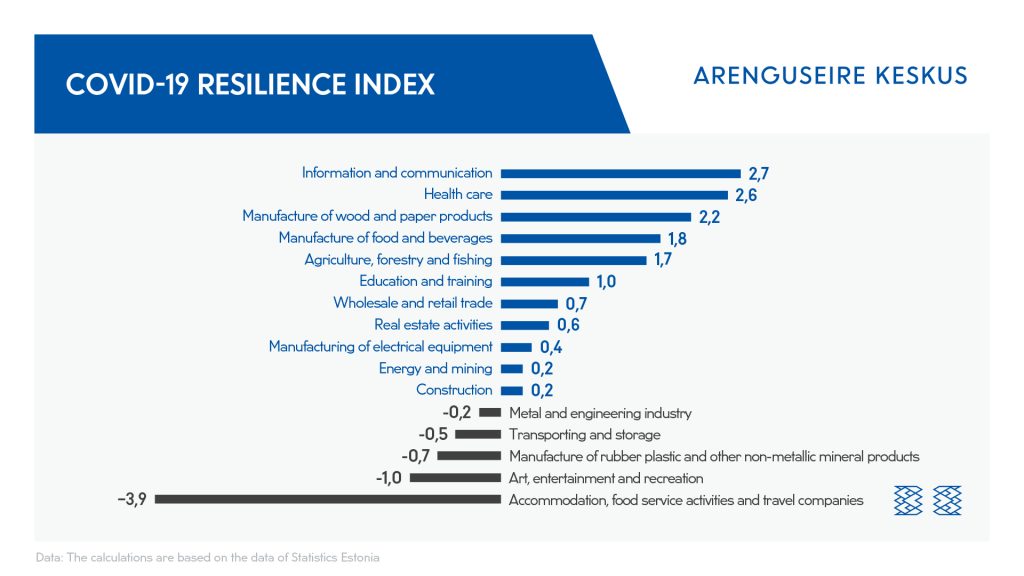The corona crisis made engineering industry develop original products
The cancellation of orders that was brought along with the first wave of the corona pandemic made companies in metal and engineering industries pay greater attention to developing original products, the report “The Impact of the Virus Crisis on the Estonian Economy. Scenarios up to 2030” by the Foresight Centre reveals. The shortage of suitable labour force and the risk-proofing of working processes has also compelled the industry to seek solutions for automating their activities.

“The metal and engineering industry forms a large part of the Estonian processing industry, and it is strongly focused on export. Therefore, overcoming the crisis is connected in particular with the restoration of foreign demand and finding new export markets,” Expert of the Foresight Centre Uku Varblane said. “During the crisis, the sector was significantly influenced by the ban on foreign labour to enter the country. For example, the lack of welders paralysed the work of several enterprises.”
Uku Varblane thinks that the most complicated month for the sector was May when the ongoing projects were being completed, but new orders were not coming in. “The crisis had the greatest impact on shipbuilding and the manufacture of trailers. The situation has been improving since the second half of summer, and return of the courage to invest in other economic sectors has brought new orders to the metal and engineering industry,” he said.
Varblane pointed out that the engineering industry companies had actively started to look for new export markets. “Besides the Scandinavian markets, Germany, the Netherlands and Denmark are also being increasingly considered. The fact that deliveries from Asia have become riskier and preferring of geographically closer suppliers have also helped conclude new agreements. At the same time, the competition is tight because Latvian, Lithuanian, Polish and Slovakian companies are also competing for the same contracts.”
Uku Varblane said that the automation of the operational processes in companies had accelerated during the crisis. “This has brought forth a challenge – the enterprises that provide solutions for automation mainly focus on large companies, and there are not enough resources for small enterprises,” he noted. Varblane added that, as a new trend, the cooperation between companies had strengthened in the metal and engineering industry as a result of the crisis. “The number of members of the federation of the companies of the industry has increased rapidly and been in the network is considered increasingly more beneficial, for example, for achieving the scale necessary for foreign markets,” he explained.
The success of the sector in the future is first of all connected with the general economic situation and the developments on export markets. “One of the central factors in preserving the competitiveness of the sector is ensuring the availability of suitable labour force. On the one hand, this means that the education system should better meet the needs of the sector, and on the other hand, there should also be broader opportunities to engage foreign labour. The image of the country as an open and business-friendly economic environment and a clearly expressed industrial policy that creates a feeling of security to companies for enlarging their activities and for investments are also very important,” Varblane emphasised. “It is also necessary to contribute to aspirations of companies towards a digital transition through support measures, in order to create more equal conditions with the competing countries. For example, during the crisis, Lithuania and Poland are allocating very large funds to step up digitisation,” Varblane said.
In 2019, the metal and engineering industry employed 4.2% of the labour force or 23,000 people. The sector provided 3% of the added value of the Estonian economy, or EUR 750 billion.
The monthly turnover of the businesses in the metal and engineering sector declined by 9.3%, or EUR 150.8 million, between March and October last year, compared to the year earlier.
According to the COVID-19 resilience index developed by the Foresight Centre, the metal and engineering sector ranked twelfth (with -0.2 points) by resilience to the crisis among the 17 economic sectors studied.
BACKGROUND
The calculations and figures of the surveys use the data of Statistics Estonia. The descriptions of development perspectives are based on the interviews with the representatives of sectoral associations and the focus group interviews conducted in cooperation with the OSKA (a system of labour market monitoring and future skills forecasting) research group of the Estonian Qualifications Authority. Read more here.
The Foresight Centre is a think tank at the Chancellery of the Riigikogu that analyses long-term developments in society and economy. The Centre conducts research projects to analyse the long-term developments in Estonian society and to identify new trends and development directions.
Latest news
-
27.06 2025Current low birth rate will lead to up to 1.3 billion euros less tax revenue in the future
In its new short report “The impact of population ageing and low birth rate on long-term state revenue and expenditure”, the Foresight Centre notes that the lower than projected birth rate will reduce government spending on family policy and education, but in the long term, it will mean up to 1.3 billion euros less in tax revenue.

 An independent think tank at the Riigikogu
An independent think tank at the Riigikogu 